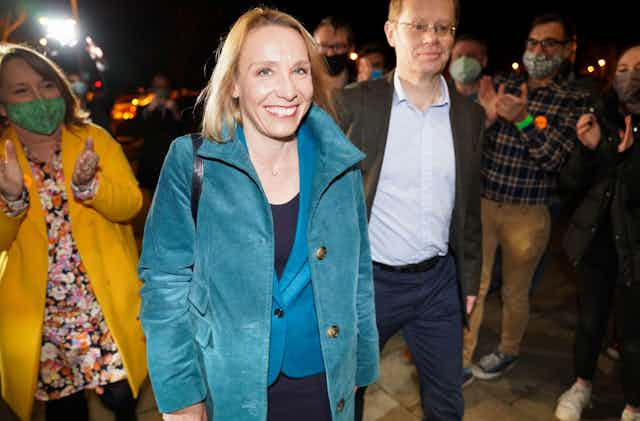The Conservative Party’s poor performance in North Shropshire byelection was not unexpected, despite the rural seat having been a Tory stronghold for nearly 200 years.
The Liberal Democrat candidate Helen Morgan overturned a massive Conservative majority of nearly 23,000 in North Shropshire to win the seat vacated following Conservative MP Owen Paterson’s resignation. Paterson was found to have broken House of Commons lobbying rules, a situation made worse by his colleagues in government appearing to try to bend the rules to save him.
The Conservative Party’s campaign was dogged by allegations of inappropriate behaviour in Downing Street by the prime minister and others, who were accused of hosting Christmas parties in 2020 while the rest of the country was adhering to strict lockdown restrictions.
The Lib Dems are celebrating, but there is more to the story. Here are four takeaways from the byelection:
1. Lib Dem success, but proceed with caution
There’s no denying that this was a fantastic result and campaign by the Liberal Democrats. They’ve read the mood of the constituency well and their campaign slogan: “the party’s over”, clearly resonated with voters, bringing one of the largest byelection swings ever recorded.
This is their second such byelection success in a year – their candidate Sarah Green overturned a 16,000 vote majority in the traditionally Tory seat of Chesham and Amersham in June 2021, winning by more than 8,000 votes and increasing their representation in the Commons to 12 MPs.
But byelections are very different to general elections, and we need to interpret their significance with caution. Lib Dem leader Ed Davey’s post-election comments that the result represents a “watershed moment in British politics” shouldn’t be overplayed too much.
The party is notoriously good at winning these battles between general elections and embarrassing the government. Their performance in the 2019 Brecon and Radnor byelection, where they reduced the government’s parliamentary majority to a single MP, was another good example of this. But the Lib Dems are much less successful in general elections, where they can’t mirror this concentrated campaigning style so easily.
2. A task for Johnson
Boris Johnson will need to work hard now to reassure his backbenchers of his capacity as a capable and competent prime minister, as well as party leader. The Conservative defeat comes on the back of a very turbulent few weeks for the prime minister. Two nights previously, Johnson faced his biggest rebellion yet from his own party over the government’s Plan B omicron restrictions.
Conservative backbencher Roger Gale warned “one more strike and he’s out” once the results were known, summing up continued frustrations within the party. But it is unlikely that we’ll see any votes of confidence in Johnson just yet, at least not from the Conservatives. As we move into the new year, the government will need to run a much tighter ship. In particular, the SNP is likely to call for an official vote of no confidence, something it has already tried once during its opposition day in November.

3. Distrust in government
The festive season has not always been a good time for Boris Johnson since he won power in July 2019. Last year’s 12 days of Christmas saw MPs recalled to parliament in a hurry to pass the UK-EU trade deal before the December 31 deadline. During the COVID Plan B debate in the Commons, some MPs questioned why the government didn’t understand the difficulties facing ordinary working people. These messages have been reinforced by the onslaught of allegations concerning Christmas parties held in Downing Street in December 2020.
Polling has demonstrated a continual slide in approval for the government since the summer, reaching just 22% this month, while the controversy around the Christmas parties remains unresolved – this is a challenge for Johnson that is not going away.
Of all the lessons for Johnson to learn from this byelection, the need to reestablish the link and trust between the voters and the government is definitely the most important.
4. This was a bad night for Labour too
The byelection result isn’t necessarily just about the Conservatives and Lib Dems. Labour leader Keir Starmer had to send his own frontbenchers out to defend the party’s poor performance – winning just 9.7% of the vote – to the press.
Starmer himself has rebutted speculation that the party had given up on the constituency, pointing to the number of visits made by shadow cabinet members. The fall in Labour’s votes compared to the 2019 general election in the same seat, combined with the fall in turnout (almost 68% in 2019, to under 50% in the byelection) suggests that many voters either didn’t care, or didn’t want to vote for either of the “obvious” party candidates.
As it comes only a few months after Labour lost the Hartlepool byelection to the Conservatives, the official opposition party also has something of a mountain to climb ahead of the next general election.

